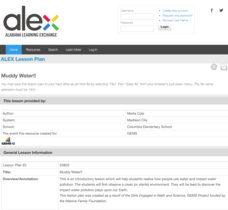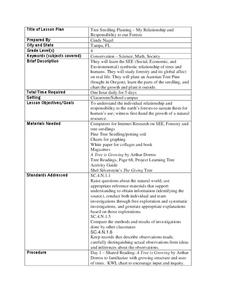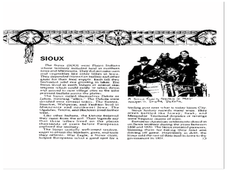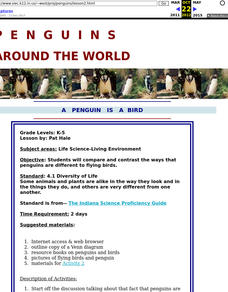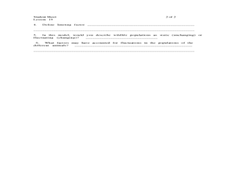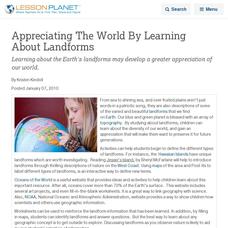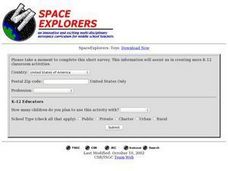Alabama Learning Exchange
Muddy Water!!
Investigate water pollution. Learners start out by completing the know and want to know portions of a KWL chart on water pollution. They read a story that stimulates thinking about water pollution and view an online resource related to...
Curated OER
Tree Seedling Planting- My Relationship and Responsibility to our Forests
In this trees lesson, 4th graders read the book, A Tree is Growing and complete a KWL chart on how trees grow and how they are used. Students research the symbiotic relationship of humans and trees, create tree collages, plant a seed,...
Curated OER
Rockin' Chalk
Fourth graders access prior knowledge of rocks and minerals. In this petroglyphs lesson, 4th graders become familiar with artwork on rocks. Students create original artworks using rock art.
Curated OER
I Went Walking
Students take pictures. In this nature walk lesson, students read I Went Walking and brainstorm a list of things they might see on a nature trail. Students take pictures of things they see on the nature trail, write a caption for each...
Curated OER
People for the Land: Native Americans in Iowa
Students identify Iowa's American Indian cultures and complete a research project for the topic. In this Iowa's American Indian lesson, students research read the background information about tribes in Iowa and complete a research...
Curated OER
What Color is Your Air Today?
Students investigate air quality. They analyze Air Quality Index data tables, interpret the graphs, complete a worksheet, and discuss trends in air quality.
Curated OER
Investigation 6 - Dinosaur Extinction
Fourth graders research and analyze theories on why dinosaurs became extinct. They need to find clues as to what the cause may have been. They record the evidence that they find to support their theory on the Dinosaur Extinction Theory...
Curated OER
Rock Discovery
Fourth graders identify rocks in this discovery lesson by examining rock characteristics and processes. They identify basic properties of minerals and rocks. They revise their theories of the natural world, once they see and learn new...
Curated OER
A Penguin is a Bird
Students compare and contrast the ways that penguins are different to flying birds.
Curated OER
Fossil Fuels vs. Alternative Fueling Systems
Fourth graders brainstorm the differences between the fossil fuels that people use in their transportation now and what they could use to minimize greenhouse gas emissions. They use a variety of techniques from webquests to writing...
Curated OER
Oh Panther
Students play a game that replicates the balance of prey and predators in an ecosystem. In this physical education lesson, students follow the instructions to play "Oh Panther!" Students collect data regarding the game and discuss the...
Curated OER
Keep Spreading the News
Young scholars examine the significance of communication in an engineer's life. They develop a list of ways engineers communicate with others, and write a book, newspaper, or story about engineers' role in the environment.
Curated OER
Appreciating The World By Learning About Landforms
Children can learn about the Earth's landforms and develop a greater appreciation of our world.
Curated OER
Got Biodiversity?
Learners examine the concept of biodiversity. Using the internet, they complete small activities in which they work together. Using the information they collected, they create a class book, make murals and write in their journals.
Curated OER
Toys in Space
Studentsexplore how gravity affects the operation of toys and simple machines. They watch a video and experiment with simple machines.
Curated OER
"To Terraform or Not to Terraform?"
Students analyze an article written by an engineer at NASA proposing colonizing Mars with human explorers on the fastest track possible. They are invited to react to the article through several activities.
Curated OER
Construct with Solids
Learners discover which properties of solids lend themselves to building a tower through hands on trial and error and observation of others as they are building. They write down the steps it took them to build the tower and label an...
Curated OER
The Search for Secret Agents
Students embark on a scavenger hunt around the school looking for indoor air pollution and mapping source locations. They predict and observe sources of indoor air pollution, understand and give examples of technologies we use related to...
Curated OER
Design Your Own Building
Students explore the use of design principles in the real world. They evaluate how problems can be solved using design principles. In groups, students design the floor plan for a building of their choice.
Curated OER
Plotting Data on a Graph
Learners investigate graphing. In this graphing lesson, students survey the class and create graphs to reflect the data collected.
Curated OER
Does Santa Claus use the Coriolis Force to Travel East?
Students are given a visual demonstration of the Coriolis Force in the Northern Hemisphere. They are encouraged to find locations around the globe and try to predict what the weather circulation patterns might be like.
Curated OER
Endocrine Excitement!
Students are divided into a group of hormones and a group of receptors. The hormones have to find their matching receptors, and the pair, once matched, perform a given action. This activity helps students examine the specificity of...


